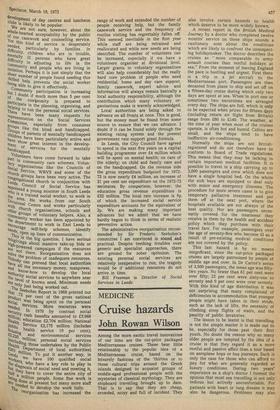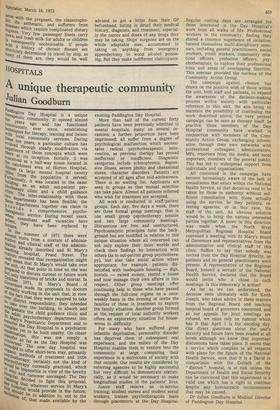MEDICINE
Cruise hazards
John Rowan Wilson
Among the more exotic travel innovations of our time are the cut-price packaged Mediterranean cruises. These bear little relationship to the popular idea of a Mediterranean cruise, based on the leisurely fashions of the 'thirties or to those cultural trips around the Greek islands designed to acquaint groups of middle-aged professional people with the mysteries of classical mythology. They are shipboard travelling brought up to date. That is to say that they are cheap, crowded, noisy and full of incident. They also involve certain hazards to health which deserve to be more widely known.
A recent report in the British Medical Journey by a doctor who completed twelve months' service on these ships sounds a cautionary note about the conditions which are likely to confront the unsuspecting holidaymaker. The doctor describes the cruises as "more comparable to army assault courses than restful holidays at sea." From the moment of leaving England the pace is bustling and urgent. First there is a trip in a jet aircraft to the Mediterranean port. Passengers are then decanted from plane to ship and set off on a fifteen-day cruise during which only two days are spent at sea. When in port one or sometimes two excursions are arranged every day. The ships are full, which is only to be expected when prices for fifteen days (including return air flight from Britain) range from £60 to £140. The weather, at the time of year when most of the cruises operate, is often hot and humid. Cabins are small, and the ships tend to have ineffective air-conditioning.
Normally the ships are not Britishregistered and do not therefore have to conform to Board of Trade regulations. This means that they may be lacking in certain important medical facilities. It is possible to travel in a ship carrying up to 2,000 passengers and crew which does not have a single hospital bed. On the whole the sick bays are equipped to deal only with minor and emergency illnesses. The procedure for more severe cases is to give temporary palliative treatment and put them off at the next port, where the hospitals available are not always of the best quality. Nor are passengers neces sarily covered for the treatment they receive in them by the health and accident policy which they purchase with their travel fare. For example, passengers over the age of seventy-five who become ill as a result of pre-existing medical conditions are not covered by the policy.
This last hazard is by no means insignficant, since the cut-price packaged cruises are largely patronised by people of middle age and over. In Dr Carter's series of 3,500 passengers, the mean age was fiftytwo years. No fewer than 61 per cent were over fifty; 22 per cent were sixty-one to seventy and 9 per cent were over seventy. With this kind of age distribution it was not surprising that many complained of deficiencies in accommodation that younger people might have taken in their stride, such as the lack of lifts, the necessity of climbing steep flights of stairs, and the paucity of public lavatories.
The lesson to be learnt is that travelling is not the simple matter it is made out to be, especially for those past their first youth. No doubt the reason why so many older people are tempted by the idea of a cruise is that they regard it as a more restful and passive affair than a tour based on aeroplane hops or bus journeys. Such is only the case for those who can afford to pay for what are generally regarded as luxury conditions. During two years' experience as a ship's doctor I formed the opinion that most sea travelling is not only tedious but actively uncomfortable. For patients with heart or lung disease it may also be dangerous. Problems may also arise with the pregnant, the claustrophobic, the asthmatic, and sufferers from diseases which require complicated dietary reglines, Very few passenger liners carry FOArs, and fresh milk for adults or children is consequently unobtainable. If people With a history of chronic disease are absolutely determined to travel by ship, as illanY of them are, they would be well ftwoon■ advised to get a letter from their GP beforehand, listing in detail their medical history, diagnosis, and treatment, especially the names and doses of any drugs they may be taking. Ships' surgeons are on the whole adaptable men, accustomed to taking on anything from emergency appendectomy to wood alcohol poisoning. But they make indifferent clairvoyants.











































 Previous page
Previous page